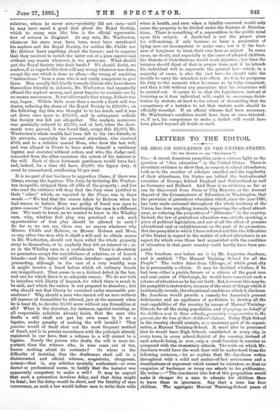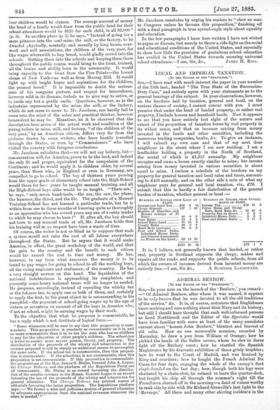LETTERS TO THE EDITOR.
DR. RIGG ON EDUCATION IN THE UNITED STATES.
[To THE EDITOR Or THE "SPECTATOR.") SIR,—A recent American pamphlet casts a curious light on the question of "free education" in the United States. There is abundant evidence to show that, in respect of school attendance, both as to the number of scholars enrolled and the regularity of their attendance, the States are behind the best-educated countries of Europe, behind England and Switzerland as well as Germany and Holland. And there is no evidence, so far as can be discovered from State or City Reports, or the Annual Report of the Commissioner of Education at Washington, that the provision of gratuitous education which, since the year 1880, has been made universal throughout the whole territory of the Union, has done anything towards improving the school attendance, or reducing the proportion of " illiterates" in the country. Indeed, the law of gratuitous education was, strictly speaking, a piece of political legislation, and not at all the effect of genuine educational zeal or enlightenment on the part of its promoters. But the pamphlet to which I have referred exhibits the difficulties of the States in regard to the matter of school attendance in an aspect for which even those best acquainted with the condition of education in that great country could hardly have been prepared.
The brochure now before me is by Mr. Augustus Jacobson, and is entitled, "The Manual Training School for all the People." The writer dates from Chicago, of which great city he is presumably a citizen. It may be doubted whether, if lie had been either a prairie-farmer or o. citizen of the great iron and coal centre of Pittsburgh, he would have conceived such a scheme of education as he has set forth. But, however this may be, his pamphlet is instructive, because of the state of things which it incidentally reveals, the educational conditions which it discloses. Mr. Jacobson would provide a remedy for America's present deficiencies and an appliance of perfection to develop all the vast capabilities of the country by means of Manual TrainingSchools for all the rising population, and of paying, on behalf of the children sent to these schoole, pecu,niavy compensation, to the parents for the loss of their children's labour. Every High School in the country should contain, as a necessary part of its organisation, a Manual Training-SchooL It must also be presumed that he would have High Schools established in every city, in every town, in every school-district of the country, instead of such schools being, as now, only a small fraction in number as compared with the elementary schools. The scale on which Mr. Jacobson would have the work done will be understood fronithe following sentence,—let us explain that Mr. Jacobson writes throughout with a solid and matter-of-fact seriousness and a steadfastness of argument which cannot be mistaken, so that no suspicion of burlesque or irony can attach to his publication. He writes :—" The enactment into law of this proposition would make it cheaper for a man to educate his children than to leave them in ignorance. Say that a man has four children. The aggregate Manual Training-School years of
four children would be sixteen. The average amount of money the head of a family would draw from the public fund for their school attendance would be $125 for each child, in all $2,000" (p. 8). In another place (p. 2) he says, "Instead of going for a mere pittance into the coal-mine, the mill, or the factory, to be dwarfed physically, mentally, and morally by long hours, overwork and evil associations, the children of the very poor, for like wages wherewith to buy bread, would gladly crowd into the schools. Getting them into the schools and keeping them there throughout the public course would bring to the front, trained, all the brains and ability born in the community. It would bring capacity to the front from the Five Points—the lowest slums of New York—as well as from Murray Hill. It would light up with bright hopes and aspirations for the children, the poorest hoveL" It is impossible to doubt the seriousness of his sanguine picture, and respect for benevolence, however wild in its.dreams, forbids us to give way to satire, or to smile any but a gentle smile. Questions, however, as to the industries represented by the mine, the mill, or the factory, which do not seem to occur to Mr. Jacobson, can hardly fail to come into the mind of the sober and practical thinker, however benevolent he may be. Meantime, let it be observed that the description here given of the actual work and condition of the young toilers in mine, mill, and factory, "of the children of the very poor," by an American citizen, differs very far from the pictures drawn by some writers, who have hastily travelled through the States, or even by " Commissioners " who have visited the country with foregone conclusions.
Mr. Jacobson calculates that—we will not say bribery, but— remuneration will, for America, prove to be the best, and indeed the only fit and proper, equivalent for the compulsion of the Continent ; and he would apply it to children older, by several years, than those who, in England or even in Germany, are compelled to go to school. The boy of thirteen years passing from the upper grade of elementary school into the High School would there for four years be taught manual training, and all the High-School boys alike would be so taught. "There are," he says, "only seven hand-tools,—the axe, the saw, the plane, the hammer, the chisel, and the file. The graduate of a Manual Training-School has not learned a particular trade, but he is within from one to three months of knowing quite as thoroughly as an apprentice who has served years any one of t.venty trades to which he may choose to turn ?" If, after all, the boy should not turn to any manual trade at all, Mr. Jacobson holds that his training will in no respect have been a waste of time.
Of course, the writer is not so blind as to suppose that such a system would not raise the cost of all labour everywhere throughout the States. But he argues that it would make America, in effect, the great workshop of the world, and that
the gain to the country and the benefit to each citizen would far exceed the cost in time and money. He has,
however, to say from what resources the money is to be found to pay wages for going to school to all the working boys, aE the rising engineers and craftsmen, of the country. He has a very straight answer on this head. The liquidation of the national indebtedness is approaching its completion, and presently some heavy national taxes will no longer be needed.
He Proposes. accordingly, instead of repealing the whisky tax or the tobacco tax, to apply one or both of those, and certainly to apply the first, to the great object he is recommending in his pamphlet—the payment of school-going wages up to the age of sixteen or seventeen on account of all the boys in America who, if not at school, might be earning wages by their work.
To the objection that what he proposes is communistic, he has a reply which is not destitute of logical force :—
" Some wiseacres will be sure to say that this proposition is communistic. This proposition is precisely as communistic as it is, and no more communistic than it is, to tax the man who has no children to pay for the education of other people's children. The school-tax is levied to render more secure person, liberty, and property. The distribution of the proceeds of the whisky and tobacco. tax in the manner proposed would be simply an additional means to accomplish the same ends. If the school tax is communistic, then this proposition is communistic. If the school-tax is not communistic, then this proposition is not communistic. If this proposition is communistic, the propositions of the Hon. James G. Blaine, General John A. Logan, the Chicago Tribune, and the platform of the Republican Party are all communistic. Mr. Blaine is on record favouring the distribution of the surplus revenue to the States. General Logan is on record favouring the use of the proceeds of the whisky and tobacco-tax for general education. The Chicago Tribune has printed scores of editorials favouring the latter proposition. The Republican platform says :—` We favour a wise and judicious system of general education by adequate appropriation from the national revenues wherever the same is needed.'"
Mr. Jacobson concludes by urging his readers to "elect no man to Congress unless he favours this proposition," finishing off with a final paragraph in true spread-eagle style about equality and education.
In the few paragraphs I have here written I have not wished to argue or discuss, but merely to throw a side-light on the social and educational conditions of the United States, and especially to show how little the provision of gratuitous school education has availed in the United States towards securing universal school attendance.—I am, Sir, &c., JAMES H. RIGG.



































 Previous page
Previous page